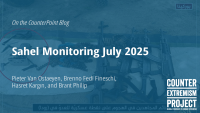Sofia Koller | CEP Webinar: From Caliphate to Prison – How Germany is Rehabilitating ISIS Returnees
Sofia Koller
Senior Research Analyst, CEP
On December 16, 2025, the Counter Extremism Project (CEP) hosted a webinar, "From Caliphate to Prison – How Germany is Rehabilitating ISIS Returnees," based on a report by CEP Germany Senior Research Analyst Sofia Koller. Ms. Koller presented key insights from her paper. Torben Adams, Head of Division, Ministry of Justice and Constitutional Affairs in Bremen, Germany, will be comparing Germany’s experience to that of other affected countries in Europe and the Middle East. With opening remarks from Marius Müller-Hennig, Advisor on Freedom, Law, and Internal Security, Analysis, Planning, and Consulting Department, Friedrich Ebert Foundation.
The CEP policy paper serves as a starting point to reflect on Germany’s approaches to the rehabilitation of ISIS returnees, discuss ongoing challenges, and present policy recommendations.
Read it here: https://counterextre.me/FromCaliphateToPrison








